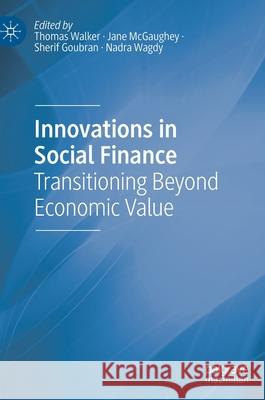Innovations in Social Finance: Transitioning Beyond Economic Value » książka



Innovations in Social Finance: Transitioning Beyond Economic Value
ISBN-13: 9783030725341 / Angielski / Twarda / 2021 / 512 str.
Innovations in Social Finance: Transitioning Beyond Economic Value
ISBN-13: 9783030725341 / Angielski / Twarda / 2021 / 512 str.
(netto: 653,27 VAT: 5%)
Najniższa cena z 30 dni: 655,41
ok. 16-18 dni roboczych.
Darmowa dostawa!
Chapter 1: Expanding Our Understanding of Value through Innovations in Social Finance, Thomas Walker, Jane McGaughey, Sherif Goubran, and Nadra Wagdy.- SECTION I: EXPLORING THE POTENTIAL OF SOCIAL FINANCE.-Chapter 2: Social Finance in the Anthropocene, Anne Snick.-Chapter 3: Social Finance in Quebec: An Ecosystemic Approach to Financial Innovation, Marguerite Mendell and Nancy Neamtan.- Chapter 4: Social Finance for Women’s Entrepreneurship in Canada, Zohreh Hassannezhad Chavoushi, Guang Ying Mo, and Wendy Cukier.- Chapter 5: The Role of Youth in Scaling Social Value Investing – The Case of Canada's National Social Value Fund, Bruno Lam, Steve Petterson, James Tansey, Mariana Martinez Rubio, and Maxime Lakat.- SECTION II: INNOVATIONS IN SOCIAL INVESTING.- Chapter 6: The Community Bond Experience in Montreal, Quebec, Jason Prince and Vanessa Sorin.- Chapter 7: Let’s Get Explicit: The Emergence of Impact-Linked Returns in the Commercial Debt Market, Lars Boggild.- Chapter 8: A University Model of Social Finance: Reflections on the University of Edinburgh’s Social Investment Fund, Dave Gorman and Julia Qermezi Huang.- Chapter 9: Opportunities in Patient Capital Financing, Julie Segal and Erica Barbosa Vargas.- SECTION III: DIGITALIZING SOCIAL FINANCE.- Chapter 10: Inside Money Creation in the Digital Era, Israel Cedillo Lazcano.- Chapter 11: Social Finance Investments with a Focus on Digital Social Business Models, Stephan A. Jansen, Clemens Mast, and Wolfgang Spiess-Knafl.- Chapter 12: From Community Bank to Solidarity Fintech: The Case of Palmas e-Dinheiro in Brazil, Asier Ansorena, Eduardo H. Diniz, Erica S. Siqueira, and Marlei Pozzebon.- Chapter 13: Social Finance and Agricultural Funding, Dániel Havran, Péter Kerényi, and Attila A. Víg.- SECTION IV: BLOCKCHAINS IN SOCIAL FINANCE.- Chapter 14: Public Governance of the Blockchain Revolution and its Implications for Social Finance: A Comparative Analysis, Stefania Paladini, Erez Yerushalmi, and Ignazio Castellucci.- Chapter 15: Blockchain Consortia for the Social Good: An Introduction for Non-Technical Audiences, Percy Venegas.- Chapter 16: Informational Efficiency and Cybersecurity: Systemic Threats to Blockchain Applications, Constantin Gurdgiev and Adam Fleming.- SECTION V: GOVERNANCE AND THE ROLE OF INSTITUTIONS.- Chapter 17: Who Should Fund Social Innovation?, Molly Sinderbrand.- Chapter 18: The Financial Intermediary Role of Peer-to-Peer Lenders, Barbara Dömötör and Tímea Ölvedi.- Chapter 19: The Role of Social Financing in Sustainable Development: The Case of Nigerian Co-operatives, Akanji Ajibola.- Chapter 20: Evaluating Impact Investments: Frameworks and Applications for Social Ventures, Alessandro Rizzello, Elisabetta Scognamiglio, Ludovica Testa, and Lorenzo Liotta.- Chapter 21: Social Investment in the UK: The Emergence of a Hollow Field, Belinda Bell.- Chapter 22: The New Venture Philanthropy, Sureyya Burcu Avci.
Thomas Walker is a full professor of finance at Concordia University in Montreal, Canada. He previously served as an associate dean, department chair, and director of Concordia’s David O’Brien Centre for Sustainable Enterprise. Prior to his academic career, he worked for firms such as Mercedes Benz, KPMG, and Utility Consultants International. He has published over 70 journal articles and books.
Jane McGaughey is an associate professor of diaspora studies at Concordia University’s School of Irish Studies, holding a PhD in Irish history from the University of London. Her research focuses on the intersections of historical and contemporary migration, gender, and ethnic discrimination.
Sherif Goubran is an instructor in the Department of Architecture (School of Sciences and Engineering) at the American University in Cairo. He is currently a PhD candidate in the Individualized Program (INDI) at Concordia University, where he is conducting interdisciplinary research on sustainability in the built environment within the fields of design, building engineering, and real estate finance.
Nadra Wagdy is an associate consultant at CID Consulting in Egypt. She is contributing to the development and scaling of an Extended Producer Responsibility program, working with the informal waste sector. She has extensive experience supporting cooperatives and not-for-profit organizations across their development phases: starting from validating their business plan and governance model to scaling-up their operations.
Thomas Walker is a full professor of finance at Concordia University in Montreal, Canada. He previously served as an associate dean, department chair, and director of Concordia’s David O’Brien Centre for Sustainable Enterprise. Prior to his academic career, he worked for firms such as Mercedes Benz, KPMG, and Utility Consultants International. He has published over 70 journal articles and books.
Jane McGaughey is an associate professor of diaspora studies at Concordia University’s School of Irish Studies, holding a PhD in Irish history from the University of London. Her research focuses on the intersections of historical and contemporary migration, gender, and ethnic discrimination.
Sherif Goubran is an instructor in the Department of Architecture (School of Sciences and Engineering) at the American University in Cairo. He is currently a PhD candidate in the Individualized Program (INDI) at Concordia University, where he is conducting interdisciplinary research on sustainability in the built environment within the fields of design, building engineering, and real estate finance.
Nadra Wagdy is an associate consultant at CID Consulting in Egypt. She is contributing to the development and scaling of an Extended Producer Responsibility program, working with the informal waste sector. She has extensive experience supporting cooperatives and not-for-profit organizations across their development phases: starting from validating their business plan and governance model to scaling-up their operations.
1997-2026 DolnySlask.com Agencja Internetowa
KrainaKsiazek.PL - Księgarnia Internetowa









